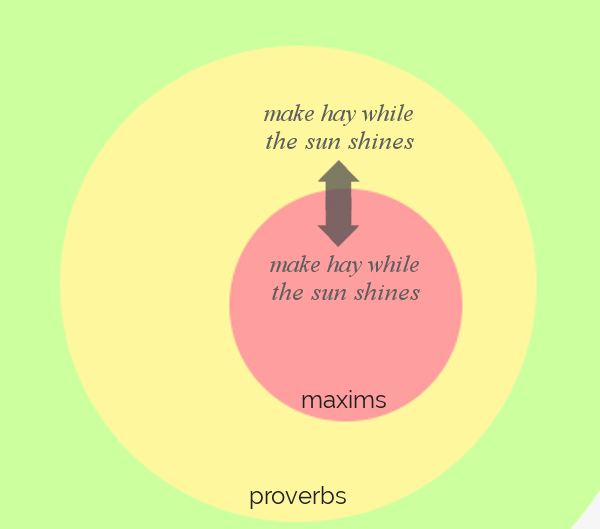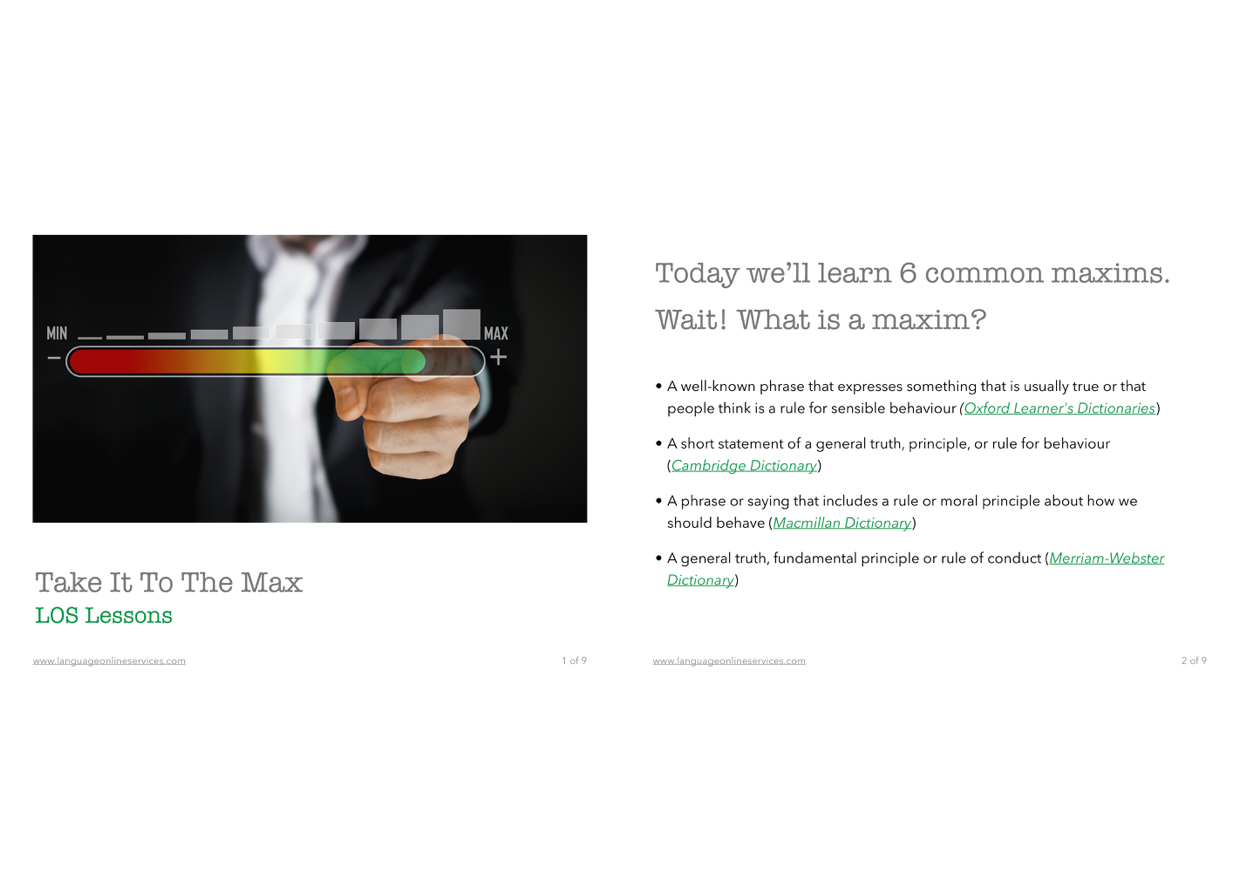Wait. What’s the difference? And what on Earth is a “maxim”?
OK. Good question.
When I think about the differences between these, I imagine a sort of Venn diagram. Yeah, the one right at the top of this post.
As you can see, this isn’t one of those classic (and much more satisfying) Venn diagrams with some circles overlapping each other; with some categories sharing features and others being independent.
Nope – this is more of a tree than a Venn diagram, which each category being a sub-category of the other.
But, as you’ll see later, none of it matters.
Before we see why, though, let’s get some definitions down …
What’s an idiom?
Simply put, idioms are phrases or sentences (or sometimes even just words) that have some sort of metaphorical meaning – they basically don’t mean what it looks like they mean.
So if you say “My eyes were bigger than my stomach,” you’re not making a biological observation about your weird eyes (or your worryingly small stomach).
And if you tell someone you turned down the job offer, it doesn’t mean you spent the day spinning a formal letter around and then flushing down the toilet. Even if you did, in fact, end up doing that. I know I did.
Anyway – you get the idea, right?
Idioms are using metaphor to describe something – usually something abstract.
OK. So what’s a proverb? And a maxim?
Here’s where things get a little tricky.
Here’s the Cambridge definition of proverb:
“A short statement, usually known by many people for a long time, that gives advice or expresses some common truth.”
OK. So far so good.
So what about maxim?
“A short statement of a general truth, principle, or rule for behavior.”
Now – I don’t know about you, but these seem pretty similar to me. Is there really a difference?
I mean, is “Make hay while the sun shines” a proverb or a maxim?
I guess it’s proverb as it gives advice and it’s a short statement.
But … isn’t it also a principle … a “rule for behaviour”?
So … it’s a maxim? It’s a proverb! No – it’s a … What is it?
Well, the answer is that it’s both.
If you’re using it to make a broad statement, then it’s more like a proverb.
If you’re using it to provide advice for a specific situation, then it’s more like a maxim.
Basically, some things can move between the outer circle of “proverb” and the inner circle of “maxim.”

But are any of these details important?
No. They’re not. They’re just fun to analyse.
What’s important is just knowing these phrases, what they mean and how to use them.
So, let’s take a look at some of the most common proverbs or maxims or whatever you want to call them.
But before we do …
Never use this idiom
Do you remember learning about idioms for the first time?
Maybe someone gave you an example of an idiom to explain what idioms were … remember that?
And the example they gave you?
Yep – it was almost certainly “It’s raining cats and dogs.”
This is the classic go-to idiom people use as an example.
And, to be fair, it’s a great example. It means “it’s raining a lot” not “there are mammals falling out of the clouds for some reason again.”
But never use it!
Why?
Because this idiom has become such a cliché. The only people who use it are people learning English who have discovered idioms for the first time.
There are loads more interesting ways of saying it’s raining … ways that won’t make people groan:
“It’s pouring!”
“The heavens opened!”
“It’s pissing it down out there!”
Please be careful with this one … it can be a bit rude.
“It’s raining buckets!”
Right … on with the proverbs/maxims …
Maxims and proverbs
1. Actions speak louder than words
Sure, sure, sure. You say you’re going to take over the world and force everyone to wear tracksuits and silver hats. But are you actually going to do it?
Actions speak louder than words!
To be fair, the taking over the world example was a bit full on. We often use this proverb for much more every-day stuff, like when someone says they’re sorry and that they won’t do it again, but you don’t quite believe them.
Or when politicians keep making promises, but don’t really get round to fulfilling them.
2. A watched pot never boils
OK. I’ve tried this and I need to make a strong disclaimer here: A watched pot totally boils. I’ve seen it with my own eyes.
I also asked a scientist friend of mine and she confirmed that indeed, a pot will boil even when it’s being watched.
Nonetheless, this is still a common expression.
You can tell this proverb to your friend who spends all day refreshing her email inbox waiting for that job offer to arrive.
If she just sits there doing that, she will lose her mind eventually. Best to take a walk or go for a swim. Or roller blading. That’s ALWAYS an option!
3. Better late than never
Obviously, this is one to use when someone’s late. But not so late that everything’s ruined.
There seem to only be two ways to use this proverb.
One is optimistically – as a way to stay positive and to say, “Hey! Don’t worry about being late! We’ll be fine!”
The other way is in a much more passive aggressive way.
You can say it in a sarcastic voice and use it as a way to get at the person who’s late. Make them feel bad!
But you know what? Maybe there’s no need to act like that!
4. Don’t count your chickens before they hatch
Well, this makes sense.
I mean – just because you have eight eggs, doesn’t mean you have eight chickens, right?
So best not count them as chickens. Until they are.
And the same thing goes for other, non-chicken things in life.
For example, don’t start celebrating getting a new job just because the interview went well. Wait until you get that confirmation letter.
Or don’t start buying massive jacuzzi cars when someone’s made a good offer on your house. You still haven’t sold it yet! Wait! Also – what’s a jacuzzi car?
5. Don’t judge a book by its cover
Another proverb telling us not to do things.
And fair enough.
I mean – here’s the cover for one of my favourite books:

Now, that looks like one of the most boring pieces of literature ever made, right?
I mean – how could you get more boring than that?
But this book, I can assure you, is one of the best books I’ve ever read.
So don’t judge the book by its cover!
The same goes for people.
Some people who look like idiots end up being really smart and interesting when you meet them.
Some professors look like tramps and some tramps look like stockbrokers.
Get to know someone before you make up your mind about them!
6. Put all your eggs in one basket
Have you seen Bitcoin recently?
Depending on when you’re reading this, the value of Bitcoin will either have just been skyrocketing or just been plummeting. It’s what Bitcoin does, right?
So, would it be a good idea to put ALL your money into Bitcoin?
Probably not. No. Let me rephrase that. Definitely not!
You might want to spend some money on more solid investments. Spread out the money a bit to minimize risk. All that “smart investor” stuff.
In other words, you don’t want to put all your eggs in one basket. Especially a Bitcoin-shaped basket.
7. The grass is greener on the other side
Yeah, sure. You think that you’ll be happier if you quit your job and become a cake salesman.
Or if you just move house to that part of town you walked through last week that seemed kind of nice.
Or if you give up the guitar you’ve been learning for the last 4 years and take up the double bass because it just looks like more fun.
Sure, sure, sure. You want to do all these things.
But here’s what I say to that:
The grass is always greener on the other side.
In other words – things you’re not doing look better only because you’re not doing them. But that’s not necessarily true.
Selling cakes might not be as fun as it looks.
That part of town might not be as nice as you think.
And the double bass? Have you thought about how much hassle it would be to move that thing around?
I mean – they’re HUGE!

8. Make hay while the sun shines
When times are good, what do you do?
Do you sit back and enjoy them?
Or do you take advantage of the situation and start working hard, saving money and “preparing for a rainy day?” (Bonus idiom there).
You might be tempted just to relax and enjoy the good times.
But you might just tell yourself to make hay!
In short, it means working hard or preparing for difficult times while the times are good.
9. Every cloud has a silver lining
This is probably the proverb I use the most.
I guess I’m an optimist. So that fits.
What does it mean?
Well, bad things happen, right?
But even from the worst thing, you can find something positive. Something you can work from. Something that can make the bad thing worth it.
Like when you get ill and have to spend a couple of weeks in hospital. You miss being home and you want to get on with work.
Then loads of friends visit and you catch up with family members you don’t normally see.
That’s a silver lining.
Or when you spend months preparing for a singing competition. You’re determined to win, so you work hard on it.
But then Barry wins the competition. Again. As usual.
You’re annoyed about it, but now you’re also a much better singer as you’ve spent months improving your skills.
That’s a silver lining!
By the way – we often just use the phrase “There’s a silver lining” or “That’s a silver lining” without talking about the clouds.
We already know about the clouds.
They’re unnecessary.
10. If it ain’t broke, don’t fix it
These last two phrases definitely feel more like maxims than the others.
They seem to be offering more specific advice – a way of doing things.
What does this one mean?
Well – it means you don’t need to mess with something if it’s already going smoothly.
Unfortunately, people often feel the need to do that.
When I was a kid, I went to this big, posh boarding school in the UK.
My parents chose it because it was quite a liberal school; there was no uniform, students were listened to, they valued the arts just as much as the sciences and they didn’t go crazy with the rules.
That was … at least … until Mr. Angus took over as headmaster.
As soon as this guy started running the school, he went mad with power, introducing all sorts of weird rules.
Some were straight-forward: like having to polish our shoes every morning and getting our shoes inspected before we got to enter the dining room for lunch.
In fact, he converted about 3 or 4 rooms around the school into shoe polishing rooms.
He really liked polished shoes.
Others were weird.
He insisted that, while eating an apple, we had to cut it up into at least 8 pieces.
The reason went like this: If you don’t cut your apple, then you have to open your mouth more and then people will see into your mouth, which is disgusting.
Obviously, this makes no sense at all.
If you’re opening your mouth to eat an apple, no one will see inside it.
Why?
Because there’s a massive apple in the way!
This guy had no sense of logic at all.
Anyway, what I’m trying to say (and what all the students said at the time) is that the school was working just fine. Why did he have to go and change everything?
If it ain’t broke, don’t fix it!
Eventually all these weird micro-managing moves got back to the parents, who complained so much to the school board that Mr. Angus was fired after a year.
11. If you can’t beat ’em, join ’em
You’ve got to pick your fights.
Some fights are worth fighting.
Like the campaign to get the coffee machine in the office fixed so we can all have cheap coffee again.
But some things just won’t work out.
Like when everyone starts leaving the office early on Fridays.
You try to tell them to stay – that we have work to do.
But everyone ignores you.
So, in the end, you accept defeat.
And you, too, start leaving the office early on Fridays.
So, this phrase is used when we give up trying to change people’s behaviour – when you feel that everyone’s just going to do it anyway.
So you do it, too.
And there we have it – the world of idioms, proverbs and maxims.
Because there’s nothing like a good old metaphor to express ourselves with.
Would you like to take it to the max now? Be my guest!
All you need to do is to check out the following DIY lesson.
Gabriel Clark, LOS Consultant & Clark and Miller Co-founder

